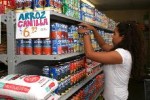A second home in the States

Working for my parents was not on my list of summer plans, but after the school year ended, that’s where I found myself. They own a food store in St. Petersburg called the Orlando Latin Market. I wasn’t sure what to expect, and it didn’t seem like the most thrilling venture. However, what I got from the experience stretched beyond any expectations – I gained a deeper insight into the immigrant voice and learned that it’s more than a store; it’s a community.
“It smells good in here,” said one woman who strolled in with a friend. The scent of oregano filled the air. Colorful cans of vegetables lined one aisle of the store, and sacks of Canilla rice lined another.
Most of the customers hail from Hispanic countries, primarily Cuba. The store sells a variety of Hispanic products: guava jam from Puerto Rico, tortillas from Mexico and purple corn juice from Peru.
Making the market further removed from the average American grocery store and more familiar to its patrons is the fact that Spanish is spoken there the majority of the time.
“There are people here who don’t know English and can’t find their products,” Diego Arsenio said. “They feel good because it’s like we have a little piece of our country.”
A native of Cuba, Arsenio moved to the United States 27 years ago. Like many people who move away from their native home, Arsenio still thinks about Cuba.
“Who wouldn’t miss their country?” he said as he sipped his coffee. “But I love this country. It’s the country of opportunity.”
Behind the register are medicinal syrups and remedies imported from different countries, including a vegetable compound from the Dominican Republic that my mother insists will help speed up a woman’s menstrual cycle.
Along with a variety of products for sale, the store also has a diner, where authentic Cuban food is prepared daily.
Mike Zooney, 58, has been coming to the store for slightly more than a year now.
“I like the Cuban sandwiches,” he said.
The store doubles as a popular place for people to congregate. Men sit at round tables discussing current events over plates of rice, beans and shredded pork. Elderly ladies mutter to one another and test avocados and mangoes by poking and prodding them. A little girl begs her mother to buy her a bag of water-balloons. Salsa music floats through the air, closely intertwined with conversation.
“This is a spiritual place,” Arsenio said. “Here I feel as if I were with family.”
Operating more like a bustling kitchen filled with family than a business, patrons take a low-key approach to commerce. Some customers stop by to promote their own businesses, leaving their business cards on top of the meat section’s counter. Notices outside the store act as classified ads, selling everything from real estate to baby parakeets.
At a table, Luis Fonseca sits quietly, his gray hair shining. Tucked inside the pocket of his crisp white shirt are a variety of items – a worn brush, a pen and a lottery ticket.
“To see if I win a prize,” he said.
Fonseca is one of the market’s many patrons, often stopping by just to sit and chat with other customers.
A native of Peru, Fonseca moved to the United States slightly more than a year ago. He said here in the United States people can meet their needs, whereas in Peru, it’s much more difficult to do that. But according to Fonseca, the loneliness is painful.
“I’m away from my kids, my parents, my siblings and my house,” he said in Spanish.
Despite his loneliness, Fonseca said he feels relaxed when he comes here and can find what he needs, including good friends.
After getting to know the customers who frequent the Orlando Latin Market, I now see it as more than a store that sells pressed Cuban sandwiches and green plantains. It is an information center, where people network with one another. It is also a second home for many, a piece of the community they left behind.







